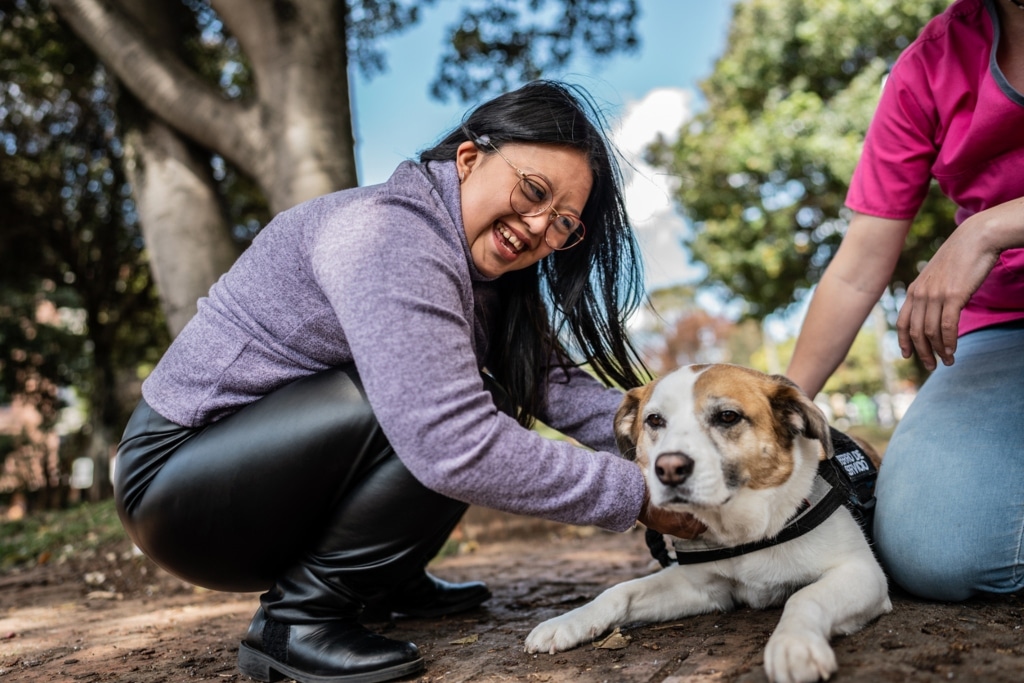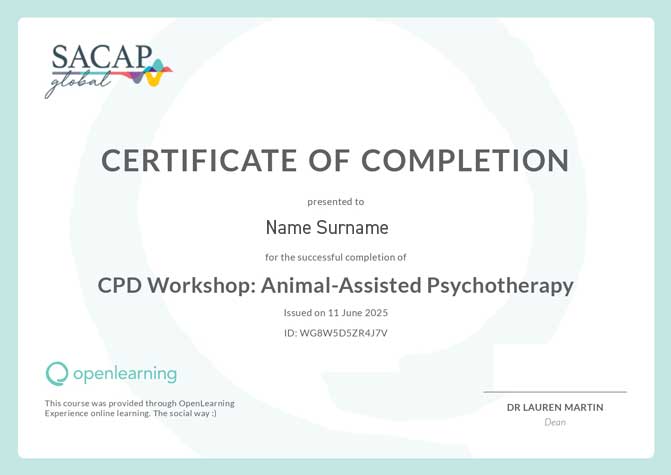Animal-Assisted Psychotherapy
R450.00

Workshop Overview
The goal of animal-assisted intervention is to improve a patient’s social, emotional, or cognitive functioning. Studies have shown positive effects of animal-assisted therapy on physiological measures such as blood pressure and hormone levels.
The Animal-Assisted Psychotherapy workshop will equip participants with theoretical and practical knowledge of the ethical integration of animals into psychological services.
Drawing from the emerging field of animal-assisted interventions (AAIs), this 90-minute session introduces a continuum-based approach for incorporating animals into therapy, ranging from implicit to instrumental involvement.
The workshop will critically examine the current evidence base, consider human and animal welfare, and explore cultural and contextual concerns within the South African setting.
The online workshop integrates ecopsychology, relational ethics, and biophilia theory, and offers clinicians guidance on ensuring best practices in this increasingly utilised therapeutic modality.
FAQs
What are the entry requirements?
Anyone 18 years of age or older can sign up for this online workshop. There are no academic entry requirements or conditions.
Who is this workshop for?
This workshop is for anyone interested in learning about animal therapy and animal-assisted psychotherapy.
What is the time commitment?
A total of 4 hours is required to complete the workshop.
What do you need to do the workshop?
- Access to Microsoft Word
- Google Chrome (recommended)
- Stable internet connection
Is the workshop assessed?
Learners are required to complete an assessment comprising of reading a journal article and answering a 15-question multiple choice questionnaire.
Is the workshop accredited?
The online workshop is accredited by the Health Professions Council of South Africa (HPCSA).
What is animal therapy?
Animal therapy or pet therapy refers to the use of animals to help people cope with challenges and recover from physical or mental health conditions.
What can you do after completing this workshop?
HPCSA registered professionals will receive 3 CPD points [3 CEU Continuing Education Units points] upon successful completion of the workshop.
Course highlights

-
Ethically and effectively integrate animals into psychological therapy across various models.
-
Explore the evidence-based benefits and limitations of Animal-Assisted Therapy.
-
Understand key risks, ethical considerations, and cultural relevance in Animal-Assisted practice.
Dates and Registration
Class of 2025 September:
2 September @ 18:00 – 20:00 (SAST)
Participants are required to attend a live online workshop (2 hours). Thereafter, participants will be required to complete an assessment comprising of reading a journal article and answering a 15-question multiple choice questionnaire. The multiple-choice questionnaire needs to be completed within 5 days.
Certification
This CPD workshop has been designed for psychologists, counsellors and anyone interested in gaining knowledge in animal therapy and animal-assisted interventions. Once you have completed the course, you will receive a digital certificate of completion.

The certificate serves as evidence of your new skills and knowledge and can be used to demonstrate your commitment to professional development.
Attend a live online session, or watch the recording, and complete an online reading and assessment.
HPCSA registered professionals will receive 3 CPD points [3 CEU Continuing Education Units] upon successful completion of the workshop.
Workshop Overview
You will explore the following topics:
Introduction
- Welcome and webinar objectives
- Introduction to learning outcomes
Defining Animal-Assisted Psychological Interventions
- Definitions of AAIs and AAT
- Human-Animal Bond
- Theoretical grounding: Biophilia hypothesis
- Ecopsychology and inter-being
- Relational ethics and co-therapy concepts
Models of Integration: A Continuum of Intensity
- Implicit, Explicit, Instrumental Roles
- Case vignettes at each level
- Alignment with therapy models: narrative, trauma-informed, DBT, existential
Evidence Base: Benefits and Mechanisms
- Psychological benefits: depression, anxiety, PTSD, resilience
- Physiological benefits: cortisol, oxytocin, HRV, dopamine
- AAT events on campus – improved student mood and stress
- Limitations of current research
- Future research recommendations
Ethical Integration of Animals in Therapy
- The animal as co-therapist: sentient, responsive, relational participant
- Guidelines: animal welfare and consent
- One Welfare and One Health frameworks
- Practitioner responsibilities: knowledge of human and animal behaviour
- Client-animal fit and therapeutic boundaries
Risks, Contraindications, and Mitigations
- Client-related: allergies, phobias, trauma history, cultural beliefs
- Animal-related: burnout, stress, overuse
Learning Outcomes
By the end of the workshop participants will:
- Understand the definitions and distinctions between Animal-Assisted Interventions (AAIs) and Animal-Assisted Therapy (AAT).
- Describe a continuum of animal integration in psychological interventions (implicit, explicit, instrumental).
- Explore how different therapeutic orientations can align with animal-assisted work.
- Evaluate the current evidence base supporting Animal-Assisted Therapy, acknowledging methodological strengths and limitations.
- Identify clinical risks and contraindications for Animal-Assisted Therapy and formulate appropriate mitigation strategies.
- Understand the ethical imperatives for protecting both human and animal welfare in therapeutic settings.
- Engage with frameworks such as relational ethics, One Welfare, and the IAHAIO guidelines.
- Recognise the need for culturally relevant Animal-Assisted Therapy practices in the South African context and beyond.
Workshop Presenter

Dr Sharon Boyce is a licensed counselling psychologist with a PhD in Psychology, specialising in nature- and animal-assisted therapeutic approaches. Her research explores the impact of equine-assisted interventions on flourishing and hope in under-resourced communities.
Drawing on logotherapy, DBT, narrative, and experiential therapies, she brings a rich, integrative approach to her private practice and international training. A recognised trainer in existential positive psychology, she develops HPCSA-accredited workshops and facilitates nature-based, story-informed learning experiences.
Known for her accessible, research-informed teaching, Dr Boyce invites practitioners to explore the ethical and relational dimensions of Animal-Assisted Therapy in this evidence-based webinar.
The Team
The SACAP Global team brings a wealth of knowledge and practical experience across various disciplines. Our expert short course developers and dedicated support team are passionate about sharing their insights to help you get the most out of your online learning journey.



















